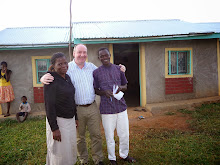But this morning Moses showed up at 5 minutes before 8 o’clock.
I also knew that this was a serious trip, because he showed up in the land rover, not the little Toyota for running about town.
“Are there going to be some rough roads today?” I enquired naively. His reply was non-committal, which I took to be a firm yes. Kenyans say so much without words.
Moses, it turned out, was good friends with a man, Sebastian, who was now a bishop somewhere in the middle of nowhere. He used to be in Kisumu, running a thriving church, but his wife, also a pastor, had begun a church in their rural home and this too was doing remarkably well. They took the decision to move away from Kisumu and found a new pastor for their city centre church.
Whilst in Kisumu Moses and Sebastian had forged a friendship, based partly on their mutual calling, but also on their love of engineering and technology. Back in the rural home Sebastian, never one to sit still, had heard about an organisation called Connect Africa and begun to work with them.
Connect Africa are based in Kampala, Uganda. Their Director is an energetic and passionate Canadian man called Trevor. Trevor travels the world on behalf of Connect Africa, looking for technology and innovation to bring back.
But he doesn’t import things, he instead finds local technicians, engineers and scientists to make African versions from local materials.
And so it was with the Bio Sand Water Filter.
In essence, it’s a small concrete case filled with sand (the type is important) and gravel. You pour in water and good “living organisms which grow in the bio layer” (see, I did pay attention) filter out the things that could kill you or make you sick. When you are ready, you pour in more water and you get the clean, processed water out of a spout conveniently located at jerry can height
It was developed by the Universityof Calgary, Alberta and made by 12 local men from rural kenyan villages, from local materials
We travelled the bumpy dusty roads of Nyanza province to a homestead in the rural area where Trevor, Gilbert, his chief technician and the rest of the team had set up a demonstration area.Mighty impressive it was too.
From there we travelled with Trevor and the team as Connect Africa donated filter units, manufactured by local people in Busia, to schools and community groups around the region. At each place we were warmly received and the filter units accepted with joy.
We talked about possible applications for the units in the slums of Kisumu where we work. Places where clean water is next to impossible to find and sickness takes away too many lives.
Trevor and his team donated a unit to us and promised to come and see us again, to talk about a possible partnership. We could be enabled to make units ourselves, for slum support, home repatriation and rural reintegration programs.
Whatever comes of it, I have enjoyed a day with people passionate about making life better for ordinary African people.
Africa may well be better, connected.



Great work done Tim!!
ReplyDeleteI came to this blog and it helped me to add few new points to my knowledge. Actually, I am trying to learn new thing wherever I find. Impressive written blog and valuable information shared here.
ReplyDeleteแท้งค์น้ำ